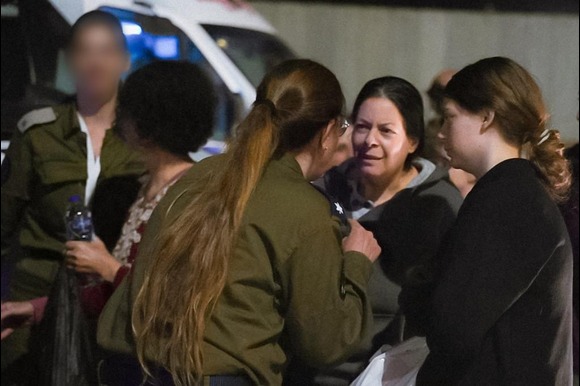Palestine: Hundreds of freed Palestinian prisoners and detainees were met with tears, embraces, and emotional celebrations as they were released by Israel and reunited with their families across Gaza and the occupied West Bank.
The large-scale release — involving around 250 convicted prisoners and approximately 1,700 detainees held without charge — marked a significant and deeply emotional moment for Palestinians. Many of those released had been serving long sentences for serious offenses, including murder and deadly attacks against Israelis, while others had been detained without trial for years.
As Red Cross buses carrying the freed prisoners arrived in Ramallah, the atmosphere was filled with both joy and grief. Many of the former inmates, draped in traditional keffiyehs, appeared frail, pale, and visibly weakened. Some struggled to walk, their physical exhaustion evident.
The release was part of an exchange deal in which Hamas freed 20 Israeli hostages and returned the remains of four others. “He is ready to embrace freedom,” said Amro Abdullah, 24, awaiting his cousin Rashid Omar, 48, who had spent two decades in Israeli prison after being convicted of murder and other crimes in 2005.
“I want peace,” Abdullah added. “I want to live a happy, safe, and peaceful life — free from occupation and restrictions.”
Reports indicated that around 100 prisoners were released into the West Bank, while others were deported or sent to East Jerusalem. Israeli authorities made clear beforehand that they wanted to avoid the large public celebrations that followed previous prisoner exchanges, where crowds gathered waving Hamas flags.
Many families refrained from speaking to the press, saying they had been cautioned by Israeli forces not to do so.
In Gaza, scenes of anticipation unfolded at Nasser Hospital in Khan Younis, where families gathered to welcome their loved ones. A field hospital was set up nearby to receive the returning detainees.
“This is a beautiful day — a day of happiness,” said Muhammad Hasan Saeed Dawood, 50, who was waiting to reunite with his son, arrested months earlier at a checkpoint. “We call it a national holiday — our detainees are coming home, despite the cost of war, the martyrs, the wounded, and the destruction across Gaza.”
Khalil Muhammad Abdulrahman Al-Qatrous, another father awaiting his son’s release, described a mix of emotions. “There is joy, there is pain, there is happiness, and there is sorrow,” he said. “We’ve been waiting since morning, anxious and hopeful.”
Ahead of the arrivals in Ramallah, ambulances from the Palestine Red Crescent Society stood by to assist those needing medical attention.
“The crying, the silence — it shows how much pain and relief these families feel,” said 23-year-old volunteer nurse Ibrahim Ifani. “For all Palestinians, this is a deeply emotional day.”
Several medics and relatives reported that some of the prisoners had suffered beatings shortly before their release. While these claims could not be independently verified, Israel’s top court recently acknowledged that Palestinian prisoners were not being provided with adequate food.
The BBC has also previously documented cases of Palestinian detainees alleging torture and mistreatment in Israeli custody.
Aya Shreiteh, 26, of the Palestinian Prisoners Club, said the released individuals endured severe abuse. “Their rights were violated in the most serious ways,” she stated. “Over the past year, many prisoners were deliberately starved and exposed to illness. Their bodies are frail from hunger and beatings.”
Despite the suffering, Shreiteh expressed cautious optimism: “Today gives us hope — a reminder that freedom is inevitable, no matter how difficult the circumstances.”
The exchange formed part of the first phase of former U.S. President Donald Trump’s proposed peace plan to end the Gaza war. The conflict erupted following Hamas-led attacks on southern Israel on 7 October 2023, which left about 1,200 people dead and 251 taken hostage.
In response, Israel launched a sweeping military campaign in Gaza that, according to the Hamas-run health ministry, has killed more than 67,682 Palestinians.
A ceasefire came into effect on Friday, ushering in a fragile calm and opening the door to further negotiations under the subsequent stages of Trump’s peace initiative — a process that many hope will finally bring an end to the war’s devastation.






